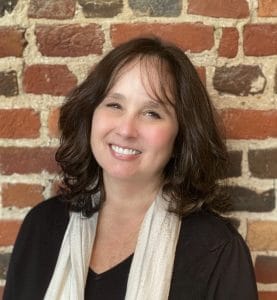Educational Consultant Leigh Ann Cahill
How did you get into this field?
Both of my parents were educators and my father was a Guidance and Counseling Professor at William and Mary. At age 10, I remember my brother and I being his guinea pigs with this new version of an IQ test called the WISC-R. As a family, we were always doing academic-y things like listening to opera, playing imagination games, visiting historical sites (growing up in Colonial Williamsburg really helped!), mapping out trips, etc.
In college, I majored in History and wanted to be a teacher (OK, an archaeologist at first, but Chemical Geography was NOT my forte.) At that time, both of my parents begged me to try other career options first since education can be a high “burn-out” occupation. “Try something that doesn’t overwork and underpay you.” So I did – I tried banking (yuck), radio broadcasting and sales (double yuck plus no money), working in a law library (soooo boring) and then I moved on to managing a progressive rock band. We made it all the way to MTV, Spin magazine and Los Angeles before the group disintegrated.
At that point, I decided to go back to college and started my M.Ed at George Mason. My first teaching gig was in Fairfax County teaching English as a Second Language. After that, I moved to teaching Technology, Civics and Drama to 7th and 8th graders. Yowza. I loved the age group and teaching but wasn’t cut out for the extreme crowd control and chaos management required in public school.
One afternoon, after a really bad day, I sat in the teacher’s lounge, got out the Yellow Pages (remember those?) and started cold-calling private schools to inquire about teaching openings. I dialed the number for The Potomac School and the assistant head answered since the receptionist was out sick that afternoon. She was lovely and after she heard that I could Teach Technology (!), she immediately had me come in for an interview. Remember that in the mid-1990s, anyone who could figure out this Internet thing and train teachers on email was a VIP.
My years at Potomac were wonderful. I found a community that embraced the type of learning environment that my parents had instilled in me. The faculty, staff, and administration was dedicated, nurturing, supportive and lifelong learners themselves. The students were engaged, caring, fun and respectful. The parents were committed to their child’s education and treated the teachers as trusted professionals. Of course there were always bumps and difficult times, but the mutual respect I found at Potomac was a game-changer for my career in education.
So how did I end up being a consultant?
After a few years of teaching and being an advisor to 7th graders, I felt ready to try something new but didn’t know what. Asking myself, “What do I love about my current job at Potomac?” the answer came down to being an advisor. Working with the students, parents and teachers in a collaborative way for what was best for each child was my favorite part of each day. That included solving problems and, sometimes, asking parents to consider other high school options for their child. I remembered meeting with the parents of students who were struggling academically, socially or emotionally and beginning the process of looking at other school options.
And there it was: I’ll help parents figure out the best school options for their child.
What do you love about the work?
First of all: the puzzle-solving. Who is this child? What are their brain, body and soul strengths and needs? Do they love poetry, volleyball, daydreaming, robotics, playing in the dirt? What part of education is important to their parents? Math, friendships, religion, sports, theatre, college-placement, location? And which schools fit into the school criteria puzzle? I enjoy working with the parents and students on discovering more about each child and helping them find schools that fit their needs.
I also really love working with the schools and education professionals. I’m so grateful to continue working with my colleagues in schools and to support the admissions team as they build their classes. Having candid conversations with each student’s teacher, tester, tutor, therapist or coach, allows me to understand the child better and to continue to learn and grow as a professional.
Why do people hire you?
There are many different reasons people hire us. We work with children entering PreK-12th grade (and some post high school programs) who are of varying academic levels and who have different needs. From 3-year-old Montessori placement to 9th grade boarding school to 11th grade therapeutic placement, we support students across the spectrum. We also help create a network of professionals and a team for the child as needed. This can include tutors, therapists, summer camps, testers, coaches, OT, speech and language, social skills groups and other professionals who can support a child and family.
How do you feel about study skills?
We love them!
Especially for students who are overwhelmed in school or with their workload, study skill development gives them a chance to take more ownership of their studies. It helps them feel more in control and independent as they move through middle and high school which can lead to a decrease in anxiety, frustration and giving up.
And, of course, independent study skills are vital for college success!
What’s your favorite piece of advice to give students?
As we work with students, we’re really trying to help them understand who they are as learners and individuals, and how that fits in with their school selection. We encourage them to stay open-minded, think outside the box and appreciate who they are.


